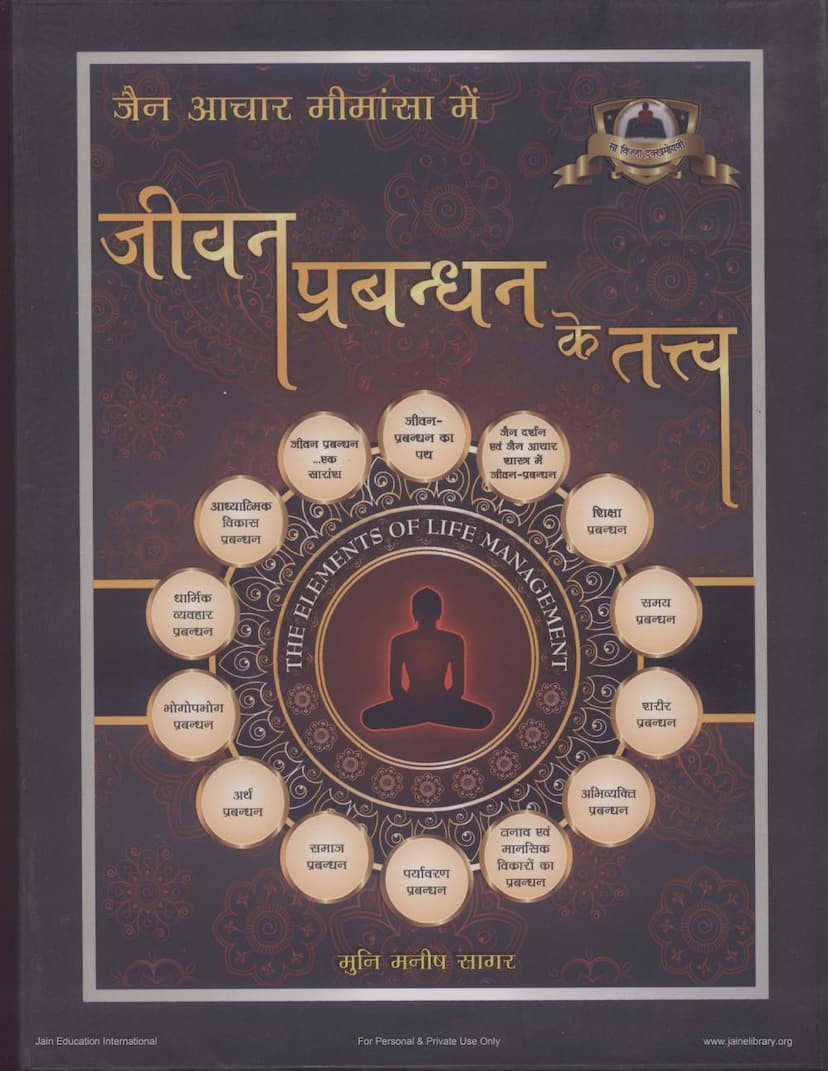Jain Achar Mimansa Me Jivan Prabandhan Ke Tattva
Added to library: September 1, 2025

Summary
The book "Jain Achar Mimansa me Jivan Prabandhan ke Tattva" by Muni Manish Sagar, published by Prachya Vidyapith Shajapur, explores the principles of life management within the framework of Jain ethics and philosophy. The book posits that Jainism, with its emphasis on the pursuit of spiritual development and ethical conduct, offers a comprehensive approach to managing various aspects of life.
The core concept of the book is that life itself is a precious opportunity, and each moment is valuable. It advocates for a life philosophy centered around "Live and Let Live," emphasizing non-violence and the avoidance of causing suffering to any living being. Life management, according to the text, is the art of navigating through the inherent ups and downs of life—such as gains and losses, unions and separations, friendships and enmities, and happiness and sorrow—with equanimity and detachment, a practice known as "Samayika" in Jainism.
The book highlights the significance of human life as unique among all living beings, a view shared by many religious traditions. It underscores that even a moment of devotion or self-reflection can accumulate immense merit.
The work systematically breaks down life management into several key areas, each explored within the context of Jain principles:
- Spiritual Development Management: Focuses on inner growth, self-realization, and the attainment of ultimate spiritual goals.
- Education Management: Discusses the importance of balanced education, encompassing both practical and moral/spiritual aspects, and how Jain teachings guide this.
- Religious Behavior Management: Examines how to conduct oneself in religious practices and rituals with proper understanding and devotion.
- Time Management: Emphasizes the value of time and how to utilize it effectively according to Jain ethical principles, avoiding procrastination and wastage.
- Body Management: Details how to care for the physical body as a vehicle for spiritual progress, including principles of diet, exercise, and hygiene.
- Communication Management: Explores the Jain perspective on right speech (vachana), emphasizing politeness, truthfulness, and the avoidance of harmful or unnecessary talk.
- Stress and Mental Disorder Management: Addresses the Jain approach to managing negative emotions, thoughts, and mental afflictions through practices like meditation and equanimity.
- Environment Management: Highlights the Jain principle of non-violence (Ahimsa) extended to the environment, advocating for respect and preservation of nature.
- Social Management: Discusses principles for harmonious living within society, family, and community, emphasizing ethical conduct and mutual respect.
- Wealth Management: Explains the Jain view on acquiring and utilizing wealth ethically, focusing on non-attachment and charitable giving.
- Consumption Management: Addresses the principles of controlling desires and limiting the consumption of material possessions and pleasures.
- Spiritual Development Management: Re-emphasizes the ultimate goal of spiritual progress and liberation.
The author, Muni Manish Sagar, himself holds a BE, MBA, and PhD, bringing a blend of modern management knowledge and profound Jain philosophical insights to the text. The book is a result of extensive research, likely drawing from ancient Jain scriptures and contemporary management theories to present a holistic framework for a well-managed and meaningful life.